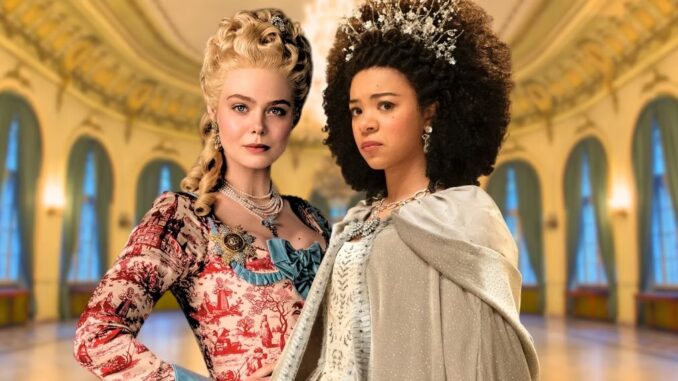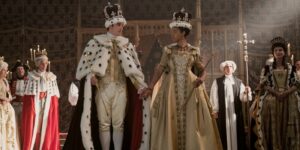
The popularity of historical dramas is on the rise, but not all of these series focus on the actual history of their time period. With shows like Queen Charlotte: A Bridgerton Story and The Great taking their own path through the subject matter, it’s clear that truth isn’t the priority. Both leads, Charlotte (India Amarteifio) and Catherine (Elle Fanning), represent real women from history, and the shows touch on their struggles with their respective marriages, but neither show is caught up in accuracy. While Queen Charlotte is set up with the concept of an alternate history, The Great takes a different approach of claiming to be “occasionally true.” Although these may seem similar, they are slightly different. The concept of Queen Charlotte makes one distinct change: Charlotte’s race, and how that impacts English society. Meanwhile, The Great takes liberty with whatever it chooses, never claiming anything to be strictly true.
Yet both of these approaches set the shows apart from more realistic examples of the genre. Historical dramas often adhere closely to history, like The Crown, which can occasionally come off as part documentary. Certainly, it interprets pieces and adds conversations that were never recorded, but the major plot points are stolen from a history book. The freedom The Great and Queen Charlotte gain from their loose approach to history allows for increased diversity and unpredictability. Additionally, not dealing with real events least these shows take a lighter and more humorous tone. These not-quite-historical dramas prove that the genre doesn’t always need accuracy to be good.
‘Queen Charlotte’s Alternate History Adds Diversity

Queen Charlotte and its predecessor, Bridgerton, actively chose not to follow the traditional look of English high society, adding people of all races into the ranks of the ton. While the historical figure’s race has been called into question, it’s certain that however Charlotte may have looked, the larger society never integrated as a result. Yet these series cleverly use the alternate history idea to add diversity to their cast. This not only sets Bridgerton apart but, especially with Queen Charlotte, adds urgency to many of the characters’ plots that otherwise wouldn’t exist. It’s a simple change, yet it has several lasting benefits.
Queen Charlotte takes advantage of historical freedom in other ways as well. Bridgerton deals little with historic events or people, with Charlotte and the occasional appearance from her husband being the major exceptions. Instead, the show focuses on the marriages and gossip of the characters’ personal lives. However, with a royal lead, Queen Charlotte ventures into more historical waters. There is an element of truth in George and Charlotte’s story — King George (Corey Mylchreest) struggles with madness, and the couple really did have fifteen children, but there is also no evidence that Charlotte ever actually tried to scale a garden wall in order to escape her wedding. Yet the fact that history isn’t a constant focus of the show allows it to be lighter. It’s not dealing with the lives of real people but a fictionalized version of them. Not everything must be taken so seriously when it’s not portrayed as a literal representation of history. While many things are realistic, the show isn’t tied too closely to the historic figures and change things around when needed.
‘The Great’ Takes a More Absurd Approach to the Story
With the note that the story is only occasionally true, The Great takes a general concept from Catherine the Great’s life and tells its own story. Although the names are largely the same, the story as a whole is wildly inaccurate, to the point that calling it historical in any sense of the word seems wrong. This allows for plenty of unpredictability, with characters living longer and dying in different ways from their historic counterparts. The unforeseeable twists add to the story, though they often remove it further from its historic roots. But, as the show doesn’t claim to be accurate, the deviation doesn’t particularly matter.
‘The Great’ and ‘Queen Charlotte’ Don’t Need to be Accurate
While these shows are based on historic figures, they don’t portray history accurately. Unlike many other historical dramas, which focus on minute details to give a realistic representation of the past, Queen Charlotte and The Great actively changes things to make their stories unique. This has the potential to cause problems by confusing the public about what happened in real life, yet neither show hides the fact that their basis is loose. In fact, these shows may not portray reality, but they have enough truth that many fans choose to research the history on their own. So people still learn history, just not from these shows directly.